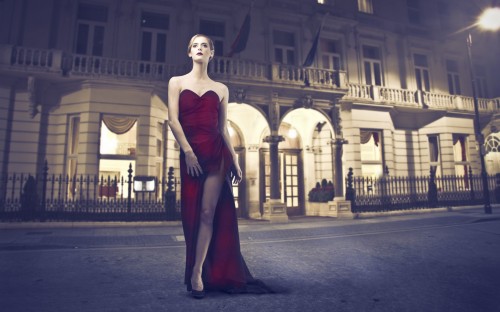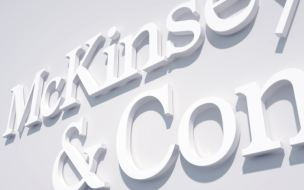What if the firm falls fowl to the economic downturn? What if consumers stay away from luxury goods for good? Will our sales pick back up?
The fears stem from the extraordinary decline in luxury sales. Europe was the worst hit. Many executives thought luxury would be recession-proof. But as consumers’ wallets were pinched ever tighter, boom turned to bust.
Jobs were cut and MBAs, who sought management careers in the once-profitable sector, would have felt the squeeze.
Luxury goods hit a first-ever full year decline. Sales fell 17% in October 2008 from a year earlier, SpendingPulse said.
Sales dropped to 8% in 2009, according to Bain & Company, far below the double-digit growth of previous years.
The unease deepened after Burberry, the British fashion house, issued a surprise profit warning. Store sales were expected to be flat for shops open at least a year – the worst performance since 2008. The announcement sent Burberry’s stock plummeting 21% in London.
It underlined the strain on luxury retailers, who began to feel short-changed. Executives were pessimistic. “We were just coming out of three or four smooth, incredibly growing years and suddenly: boom, it hit," said Mimma Viglezio, of Gucci Group, at the time.
Mimma and 400 senior luxury executives, business leaders and financiers from around the world had gathered at the FT Business of Luxury Summit in Monaco two years ago.
It was there that the sector’s future was being decided. Sustainability was propelled to the top of executives’ agendas. Global expansion and the rise of the internet were also key themes.
Nobody outside of the group of executives knew the full extent of luxury company's concerns. Yet the affects were felt being felt outside the boardroom, too.
Fashion brand Chanel cut 200 jobs at the height of the recession in 2008. Versace Group, the Italian fashion house, axed 350 jobs in 2009 – about a quarter of its global workforce. The same year, Burberry slashed 300 UK jobs in a bid to save the company about £30 million.
Managers, many of whom studied MBA degrees at business school, began shunning the sector. No one wanted to touch companies leaking profits and shedding jobs.
“Trading conditions in the wake of the global financial crisis have been severe and the company expects to make a loss in 2009,” said Gian Giacomo, chief executive officer of Versace Group, at the time.
“No organisation can allow a situation like this to continue, especially considering the flat outlook for 2010,” he added.
But many luxury brands could console themselves with profits on their books – even if they had slowed significantly.
The Louis Vuitton shop in London's New Bond Street showcased luxury goods from luggage to furniture. Prices peaked at $70,000 for a slice of the French brand.
Louis Vuitton handbags were never sold in such numbers. The health check on Europe’s luxury market had scared companies into action. Business was beginning to boom once again.
LVMH Group, the brand's owner, reported sales growth of 13% in the first half of 2011. PPR, Gucci's owner, posted luxury sales growth of 23% over the same period.
Across the pond, Tiffany’s first-quarter sales were up 20% to $761 million the same year. Euromonitor believes that despite a volatile global economic outlook, the luxury goods market is set to generate an extra $74 billion in new sales by 2017.
And China is on track to become the second biggest luxury market in the world after the US in the next five years. Bank of America's Merrill Lynch predicts China’s share to double from 10% in 2010 to 22% by next year.
Certain MBA students are hoping to capitalize on the boom. “The combination of business and creativity is what separates the luxury industry,” said Rebekah Shriver, an student on ESSEC Business School’s International Luxury Brand Management MBA.
“You have to be able to work closely with creative people, and for me this is a challenging and exciting prospect.”
Some graduates have gone on to MBA jobs at prestige luxury brands including Louis Vuitton, Chanel and Lancôme. Since ESSEC’s program's launch, 450 graduates have banked jobs in 30 countries around the world.
The career trail leading to luxury lures MBAs because of their passion and the industry’s uniqueness. Charles Bell left business school in September and was snapped up by LVMH after a three-month summer MBA internship.
“Most of the recruiters I have met at LVMH over the past year... I can assure you that they all know about this program, and it has been a great business card to leverage,” said Charles, who also studied on ESSEC’s program.
“Enrolling in the ESSEC International Luxury Brand Management MBA remains a signature, world-wide, in this industry,” he added.
Jean-Philippe Muller stood talking to the backdrop of the Côte d'Azur. The general director of International University of Monaco was talking up the luxury industry as the sun glistened off the Monaco stretch of the French Riviera.
“IUM is involved in the luxury education field for two reasons,” he smiled. “It’s part of the Inseec Group – one of the leaders in the luxury education field. Second, it is located in the principality of Monaco.”
Jean-Philippe had left his city office to encourage people to join his school’s luxury MBA and Master’s programs.
Dozens of delegates had joined him at the Monaco Symposium on Luxury, a shindig where luxury leaders and business schools drink wine on the Riviera and talk up the market.
Insecc reckons the industry will generate more than €230 billion in worldwide sales this year. A specialist MBA degree is a way to move into a luxury management job. Since ESSEC set the benchmark, other schools have followed suit.
“Many luxury firms have been growing in the past few years very rapidly – especially Italian companies – under the guidance of talented and enlightened company managers,” said Alessandro Brun, career services director at MIP Politecnico di Milano.
The school rolled out its inaugural luxury management MBA specialization last year. MIP is partnered with Gucci and has close links to a Diesel brand, as well as luxury car companies such as Lamborghini.
The school was spurred to launch its new specialization after much research into the luxury sector, said Alessandro. “We started working in luxury with companies since the very beginning of 2000,” he added. “That means quite a [long time] before launching the luxury programs, the MBA was focused on luxury.”
Many leading luxury companies rely on university’s consumer research. The previous top-down attitude of designers deciding what fashion is has changed, said Annalisa Tarquini, director of the Master in Luxury Management at IUM.
“I believe that now and more in the near future consumer insight is going to be more critical because all companies and brands in the luxury environment have to be consumer-centric,” he added.
Meanwhile, the United States is set to provide the most job opportunity. MIP draws candidates from as far afield as China, said Alessandro, but they are not limited to careers in Italy.
“I would say the US in particular has been growing on a compound average growth ratio of 6% in the last three years,” said Annalisa from IUM.
But he added: “We have the traditional most important market – North America – becoming stronger and stronger, and at the same time this… nationality of Chinese people representing more than one [luxury] purchase over four.”
After a period of bust, the business of luxury is back in boom years.
RECAPTHA :
8d
68
e0
97








